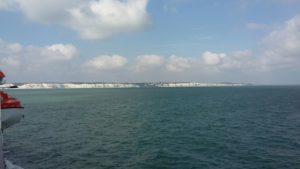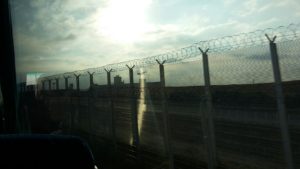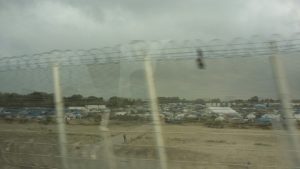3 Things I Learned from Seeing The Jungle in Calais
The Jungle in Calais, France is quickly becoming one of the best known migrant camps in the world. Stretching for over 4 square kilometers, it’s 7000+ population is growing every day.
Those who make it to the camp will often try to board vehicles to enter the UK illegally which has resulted in extensive security fences and searches to be carried out in and around the port of Calais (one of the main routes between Britain and France).
Recently, I saw Calais and ‘The Jungle’ for myself. My first reaction was one of shock at the sheer size of the camp and it’s closeness to the port itself.
Is that your reaction too? To feel outraged or threatened by such a body of men (some estimates say 62% males with an average age of 33) waiting to reach the UK?
Or is there a deeper story that you can learn from? Since seeing the camp, I’ve had time to think. Here’s what I’ve learned.
The Jungle in Calais: A Place of Hope?
For many who reach ‘The Jungle’, it is a place of hope. A last stop off point before attempting to stow away on a British bound lorry.
What lies across the short stretch of sea? A land of hope.
The Jungle exists in part because of European Union (EU) asylum law. Anyone wishing to seek asylum must apply for it in the first EU country they come to – for many this is Italy or Greece.
However most will seek the more developed and wealthier countries of Germany, Netherlands and the United Kingdom where the allure of free education, generous benefits and opportunities for work abound (or so they are told).
Others may already have family living in the UK legally or illegally and want to join them. Many Jungle residents will attempt daily to smuggle themselves onto lorries and vehicles heading for the British port of Calais.
Others have paid upwards of £2000 to be driven across in private vehicles run by organised gangs. What beckons on the other side? For many, exploitation and homelessness.
Much of this economic migration is motivated by hope. Hope of a better future. Hope of being reunited with loved ones. Hope of an education in an English speaking school or University.
Hope has motivated them to cross oceans, land and risk life for a better future.
So if those who are living in the Calais Jungle right now are motivated by hope, can you harness this drive for your own life?
What future do you hope for? For yourself? For your kids? What does it look like? Can you imagine it? Maybe it’s
- A family life full or harmony and understanding
- A dream job which excites you every day
- The ideal house and garden
- A fit and healthy body
- Smart and resilient kids
Use the motivating power of hope – of anticipation of the future. You may well end up reaching the distant shores of your dreams.
Physical Barriers and the Walls of the Mind
Driving from Calais into the French countryside and I’m struck by the size and length of this fence. Over 15ft tall chain link with a razor wire top. It’s a formidable barrier.
But not formidable enough.
In fact earlier this year it was announced that the British Government is funding a £2 million wall around the port to add to the existing security.
Why?
Because fences can be pulled down, climbed or cut.
What about walls? Walls can’t be climbed but they can be pulled down (Berlin anyone), they can definitely be climbed and they can be tunnelled under.
So while walls are a deterrent, they are not fool proof.
Which reminded me of a blog post by author and cartoonist Scott Adams on Donald Trump’s infamous Mexico Wall (read the full article here). Here’s Adams’ take on walls and immigration:
“Realistically, you can’t control the borders with any kind of barrier if the rewards for entering the country illegally are high enough. But if you keep the rewards low, your wall has a good chance of working. Trump knows construction and he knows persuasion. He intelligently combined those talents to create his wall plan.”
What is going to be more effective in keeping migrants from crossing the channel? A physical wall or a barrier of the mind?
Which makes me think: what barriers of the mind have you constructed recently? After all, if they keep immigration at bay, mental walls could limit other aspects of your existence such as your ability to progress in life, to spend more time with your kids, to live the life you want to.
A turning point for me was reading in Gorilla Mindset these words: “I give you permission.” Until that point, I’d constructed barriers in my mind about why I couldn’t do things I wanted to like:
- Chase my dreams of a better life for me any my family
- Get back to writing and starting a blog
- Be the best Dad I could be
It might sound a bit cheesy or kooky, but does it ring true with you? Have you created barriers for yourself that limit what you do and how you live your life? Is it time to tunnel under those and start living?
The Problem of Control (And Why We Don’t Really Have Any)
Look at the pictures of The Jungle. What do you see?
Most people see a problem. Some see a horde of potential invaders waiting to cross the English Channel and put at risk an entire nation. Others see thousands of people caught in limbo on foreign soil looking for a place to call home.
If we agree that this is a problem, what are the solutions?
- An end to all wars?
- Equality across all nations?
- The Globalist dream of a world without borders?
- Better security, higher fences, stronger controls?
- None of these or a combination of all four?
What if we aren’t close to solving this problem and never will be? Imagine if what we are seeing are the birthing pains of a new age of instability, mass migration, conflict and hardship.
We, the human race, have been here before. Read ‘The Lucifer Principle’ by Howard Bloom.
I did and I was struck by how closely our times mimic the closing stages of other great civilisations like the Roman empire, Byzantium, Carthage.. the list goes on.
What does any of this mean? How much do you really (and I mean really) have control over global events and societal shifts?
Not much right?
But what do you have control over?
You have control over yourself. You have control over what kind of person you are, your health, how much you sleep, what you eat, what you focus your time on, what kind of father you are.
All of those things are fully within your control. Focus on them before you try to save the world.
Final Thoughts
Where do we go from here? I hope that I’ve given you an insight into how you can view life and situations in different ways.
When I first saw The Jungle I was horrified at the scale (estimates suggest the population will be over 10,000 be the end of 2016). But spending time thinking about what this means for my life, and yours, has led me to some unexpected conclusions.
Ultimately we have very little control of our lives outside of certain parameters. If we focus on these without wasting energy on events that we can’t control or influence are we going to be better or worse men and fathers?
What ever choice you make, focus on the self first before you try to fix other people’s problems. You and your family will be grateful.
Neil
P.S. If you found this thought provoking, you can sign up for my emails where I’ll provoke your thoughts once every 1-2 weeks. Get them here.




It’s not the government funding fences. It’s British taxpayers. It’s your time and work.
Very hard work at that! Thanks for reading and commenting.